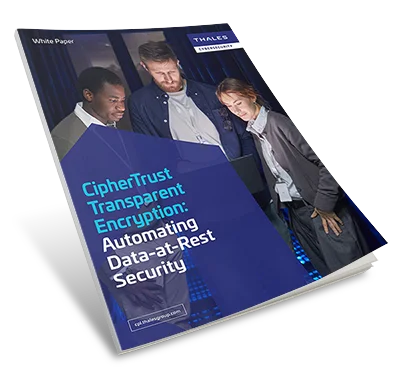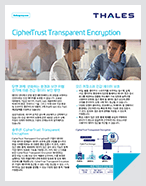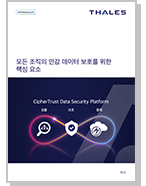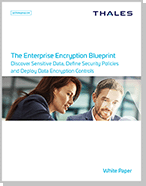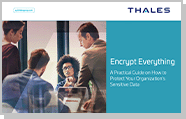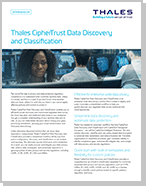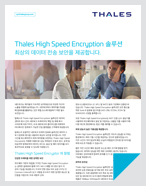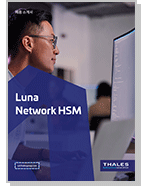모범 사례
브라질의 일반 데이터 보호법(LGPD)은 개인 데이터에 대한 데이터 보안 모범 사례를 요구하고 있으며, 익명화된 개인 데이터를 입수할 가능성이 있는 사람이 쉽게 원래 상태로 되돌릴 수 없는 경우 더 이상 법의 적용 범위 내에 있는 것으로 간주하지 않는다고 명시하고 있습니다.
데이터 보안을 위한 모범 사례에는 항상 다음이 포함됩니다:
- 데이터 검출 및 분류
- 데이터에 대한 사용자 액세스 제어
- 데이터의 암호화 또는 토큰화
- 데이터 암호화에 사용되는 키의 보호 및 관리
- 데이터 액세스 이벤트 로깅
탈레스는 조직이 이러한 모범 사례를 구현하여 LGDP를 준수할 수 있도록 다년간 지원해 온 경험을 보유하고 있습니다.
데이터 검출 및 분류
민감 데이터를 보호하는 첫 번째 단계는 조직 내 어디에서든 데이터를 찾아 민감한 것으로 분류하고 입력하여(예: PII, 재무, IP, HHI, 고객 기밀 등) 가장 적절한 데이터 보호 기술을 적용할 수 있도록 하는 것입니다. 새로운 데이터가 간과되지 않고 조직이 규정 준수에서 벗어나지 않도록 데이터를 정기적으로 모니터링하고 평가하는 것도 중요합니다.
탈레스 CipherTrust Data Discovery and Classification은 온프레미스 및 클라우드에서 구조화 및 비구조화된 민감 데이터를 효율적으로 식별합니다. 에이전트 없는 배포 모델과 에이전트 기반 배포 모델을 모두 지원하는 이 솔루션은 규제 대상 데이터를 신속하게 식별하고 보안 위험을 강조하며 규정 준수 격차를 해소하는 데 도움이 되는 기본 제공 템플릿을 제공합니다. 간소화된 워크플로는 보안 사각지대를 찾아내고 해결 시간을 단축합니다. 상세한 보고서 기능은 규정 준수 프로그램을 지원하고 경영진의 커뮤니케이션을 촉진합니다.
강력한 액세스 관리 및 인증
탈레스가 제공하는 액세스 관리 및 인증 솔루션은 조직이 데이터 보안 규정을 준수하는 데 필요한 보안 메커니즘과 보고 기능을 모두 제공합니다. 사용자가 민감 데이터를 저장하는 애플리케이션에 로그인할 때 적절한 접근 제어를 시행하여 민감 데이터를 보호하는 솔루션입니다. 광범위한 인증 방법, 정책 및 역할 기반 액세스를 지원하는 탈레스 솔루션은 기업이 자격 증명의 손상이나 도난, 내부자의 자격 증명 남용으로 인한 데이터 유출 위험을 완화하도록 지원합니다.
스마트 SSO(싱글 사인 온) 및 단계별 인증 지원을 통해 기업이 최종 사용자의 편의를 최적화하여 필요할 때만 인증하도록 할 수 있습니다. 광범위한 보고서 기능을 통해 모든 액세스 및 인증 이벤트에 자세한 감사 이력을 생성하여 광범위한 규제 준수를 입증할 수 있습니다.
저장 상태의 민감 데이터 보호
CipherTrust Data Security Platform은 데이터 검출, 보호, 제어를 하나의 플랫폼으로 통합하는 데이터 중심 보안 제품과 솔루션의 통합 제품입니다.
- 검출: 조직은 데이터가 있는 위치에 관계없이 데이터를 검출하고 분류할 수 있어야 합니다. 이 데이터는 파일, 데이터베이스, 빅데이터와 같은 다양한 형태일 수 있으며 온프레미스, 클라우드, 백업 전체에 걸쳐 저장될 수 있습니다. 데이터 보안, 규정 준수는 노출된 민감 데이터를 해커와 감사자보다 먼저 찾는 것으로 시작됩니다. CipherTrust Data Security Platform을 통해 조직은 효율적인 데이터 검출, 분류 및 위험 분석 기능을 활용하여 온프레미스, 클라우드의 민감한 데이터에 대한 완전한 가시성을 확보할 수 있습니다.
- 보호: 조직이 민감한 데이터의 위치를 파악하면 암호화, 토큰화와 같은 보호 방침을 적용할 수 있습니다. 암호화, 토큰화를 통해 민감 데이터를 성공적으로 보호하려면 암호키 자체를 조직에서 보호, 관리하고 통제해야 합니다. CipherTrust Data Security Platform은 액세스 제어를 포함하는 파일 수준 암호화, 애플리케이션 계층 암호화, 데이터베이스 암호화, 정적 데이터 마스킹, 볼트 없는 토큰화, 다양한 서비스 범위를 지원하는 볼트 토큰화를 포함하여 종합적인 데이터 보안 기능을 제공합니다.
- 통제: 조직은 데이터 액세스를 제어하고 키 관리를 중앙 집중화해야 합니다. 모든 데이터 보안 규정과 지침에 따르면 조직은 데이터, 암호키에 대한 승인, 무단 액세스를 모니터링, 감지, 제어, 보고할 수 있어야 합니다. CipherTrust Data Security Platform은 여러 클라우드 서비스 공급업체(CSP), 하이브리드 클라우드 환경에서 강력한 엔터프라이즈 키 관리를 제공하여 중앙에서 암호키를 관리하고 보안 정책을 구성하여 조직이 클라우드, 온프레미스, 하이브리드 환경에서 민감 데이터를 제어하고 보호할 수 있도록 합니다.
- 모니터링: 마지막으로 기업은 민감 데이터에 대한 액세스를 모니터링하여 악의적인 내부자, 권한 있는 사용자, APT 및 기타 사이버 위협으로부터 진행 중이거나 최근에 발생한 공격을 식별해야 합니다. CipherTrust Security Intelligence 로그 및 보고서는 주요 SIEM(보안 정보 및 이벤트 관리) 시스템을 사용하여 규정 준수 보고를 간소화하고 위협 탐지 속도를 높입니다. 이 솔루션을 사용하면 무단 액세스 시도에 대한 즉각적인 자동 보고와 대응이 가능하며, 권한 없는 사용자의 의심스러운 사용 활동을 식별하는 데 필요한 행동 패턴을 구현하는 데 필요한 모든 데이터를 제공합니다.
전송 중인 민감 데이터 보호
탈레스 고속 암호 생성기(High Speed Encryptor, HSE)는 네트워크에 의존하지 않는 이동 데이터 암호화(계층 2, 3, 4)를 제공하여, 사이트 간 데이터 이동 시 또는 온프레미스에서 클라우드로 데이터를 이동할 때 데이터를 안전하게 보호합니다. 고객은 성능 저하 없이 합리적인 비용으로 탈레스의 HSE 솔루션을 이용할 수 있으며, 이 솔루션으로 데이터, 동영상, 음성 및 메타데이터를 도청이나 감시, 명백하거나 은밀한 가로채기로부터 효과적으로 보호할 수 있습니다.
암호키 보호
탈레스의 Luna HSM은 강화된 변조 방지 환경으로 안전한 암호화 처리, 키 생성 및 보호, 암호화 등을 제공합니다. 세 가지 FIPS 140-2 인증 폼팩터로 이용 가능한 Luna HSM은 다양한 배포 시나리오를 지원합니다.
또한 Luna HSM는,
- 루트키 및 인증 기관(CA)키를 생성하고 보호하여 다양한 사용 사례에서 PKI를 지원합니다.
- 애플리케이션 코드 서명 기능으로 소프트웨어가 안전하고 변조되지 않으며 인증된 상태를 유지하도록 합니다.
- 디지털 인증서를 생성하여 전매 전자 장치의 자격 증명과 인증을 통해 IoT 애플리케이션·기타 네트워크 배포를 지원합니다.

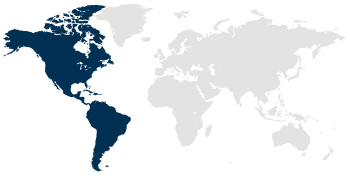 탈레스는 기업이 브라질의 LGPD를 준수하고 벌금과 위반 통지를 피할 수 있도록 다음과 같은 데이터 보안 모범 사례를 지원합니다.
탈레스는 기업이 브라질의 LGPD를 준수하고 벌금과 위반 통지를 피할 수 있도록 다음과 같은 데이터 보안 모범 사례를 지원합니다.